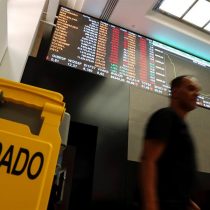
“Uncertainty, uncertainty… more uncertainty.” This sums up Gemines in his March report on the political and economic situation affecting Chile, marked by the social outburst, the internal and external economic scenario and above all the impact of the coronavirus.
“While Chile’s economy has shown good adjustment and responsiveness to the effects of mobilization and violence, the possibility of a global crisis over the coronavirus epidemic and its extension to Chile may result in a recession this year” , indicates the report for this month. In terms of figures, Gemines notes that while it was in the first instance seen as “possible to have a 2020 with growth of between 1.0 and 2.0 %”, considering that in terms of activity and employment “the numbers by the beginning of this year have been less bad than what expected,” the consequences of the coronavirus pandemic have struck a new blow in expectations.
“The setting has changed with that speed and inexorability that only Nature can give us. Avalanches begin smoothly until they are exponential in their growth and potential destruction. This time it came in the form of a pandemic, something very different from those for our usual earthquakes or floods,” he says.
In terms of sectors, the report notes that “it is quite likely that the contagion of the virus will increase in the coming weeks and become high in the autumn and winter, which will obviously affect the normal functioning of a relevant part of the economy. Thus, the services sector, with particular impact on tourism, restaurants and hotels, recreation, transport, education and trade, would significantly lower its level of activity, leading to a contraction of GDP during the second and third quarters. The intensity of this drop will depend on the evolution of contagions in the coming months.”
In this context, they warn that a phase 4, like that which was declared in the country on Monday, and if you reach “the obligation to stay in the houses”, as it has been decreed in other countries, “the economic impact will be significant, with a very sharp fall in GDP in the second and probably in the third trimester.”
Thus, they conclude that “although without being able to rule out a worse development, given that the internal and external economic scenario is still very ‘liquid’, we anticipate that economic growth this year would be in a range of -1.0 to 1.0”.
“Externally, it seems reasonable to think that this year’s world economy will enter recession, which may be deeper than the 2009 one caused by the subprime crisis, even though over the next few months the impact of the pandemic should be reduced significantly in the northern hemisphere. A small and very open economy like ours has historically been seriously impacted when the global economic environment deteriorates, even more so when this deterioration seriously affects our main trading partners,” the report warns.
But the picture may be even worse, given that “obviously if the external situation worsens beyond what is expected, and the negative impact of the coronavirus extends to the second half, it is feasible to think of a steeper gdp drop, which could be higher than in 2009 (-1.6%) the result of the subprime crisis.”
“If this crisis becomes a profound slowdown in global growth or a recession, there is no doubt that domestic growth will suffer much more and a recession could occur in Chile, a scenario that unfortunately cannot be ruled out. This result is conditioned on the severity with which the epidemic develops in Chile,” he adds.
Plebiscite
The situation – according to Gemines – also has clear political consequences and calls into question the conduct of the plebiscite on 26 April, as they have been warning from the Medical College and some political sectors. “It is quite likely that the incidence of coronavirus in our country will increase significantly over the next few weeks, which in the extreme can lead to an evolution similar to that observed in countries such as Spain or worse italy. If so, the conditions for the plebiscite are unlikely to be carried out,” the report stresses.
As for keeping the electoral calendar intact, Gemines warns that “no matter how much political will there is, and with all possible safeguards, it would obviously be very irresponsible on the part of the authority to go ahead with the election. If held under these conditions, the level of participation would be very low, simply out of people’s reasonable fear of contagion, which in practice would detract from the legitimacy of the process.”
Another side consequence of the pandemic is the restoration of public order. In fact, Gemines stresses that “even mass demonstrations, vandalism and violence, so present in recent months, would decrease significantly in a scenario of increased incidence of the virus. In other words, we would probably have a postponed plebis and a significant restoration of public order, which compared to the current moment, means a very significant change in the political arena.”




